高中英语 Unit 2 English around the world Reading The road to modern English课件 新人教版必修1
文档属性
| 名称 | 高中英语 Unit 2 English around the world Reading The road to modern English课件 新人教版必修1 | 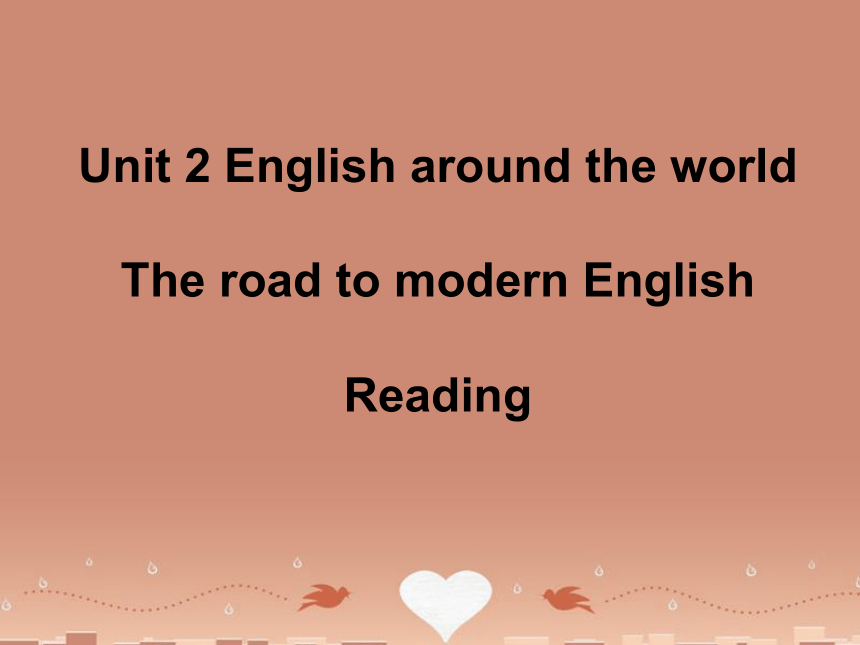 | |
| 格式 | zip | ||
| 文件大小 | 56.3KB | ||
| 资源类型 | 教案 | ||
| 版本资源 | 人教版(新课程标准) | ||
| 科目 | 英语 | ||
| 更新时间 | 2016-04-13 15:01:02 | ||
图片预览

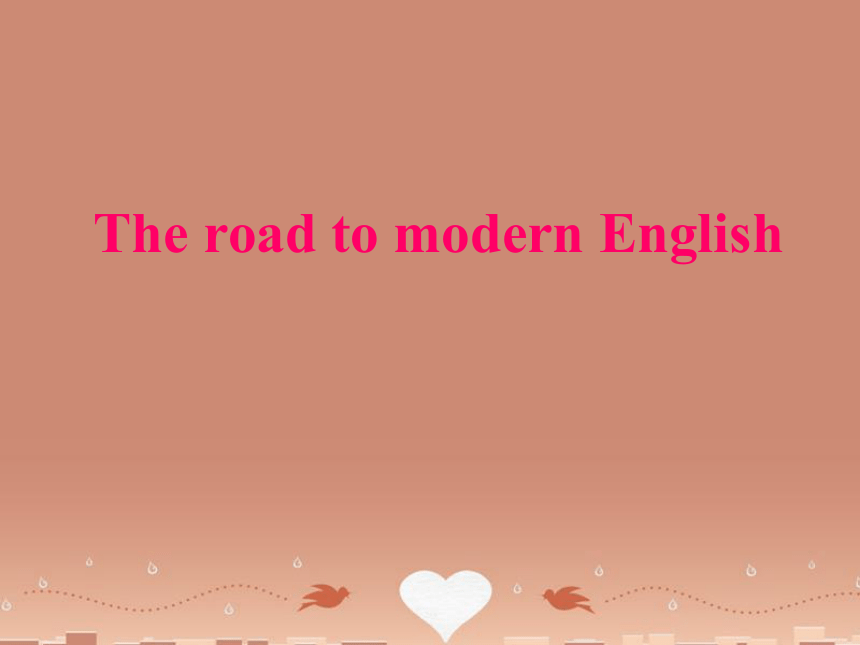

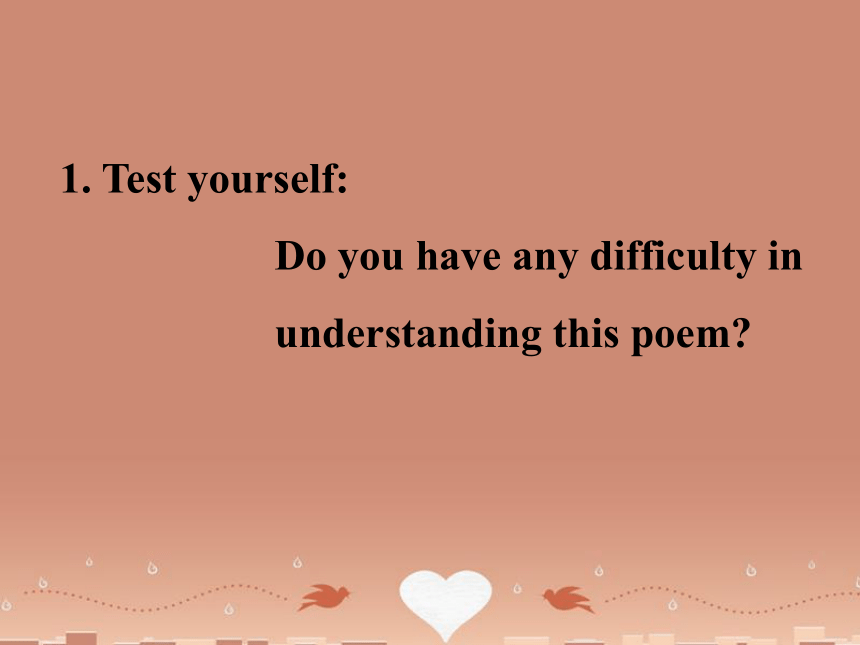
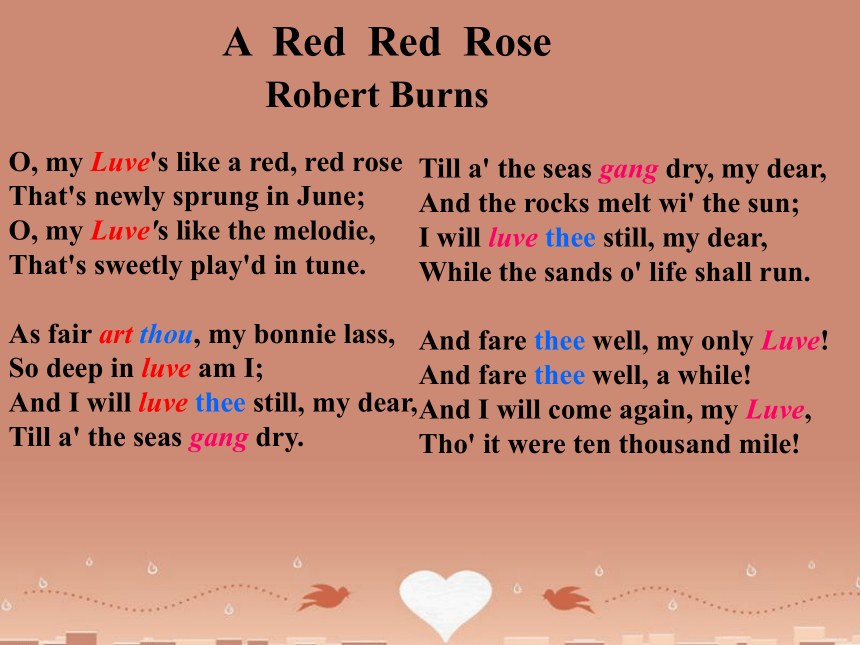

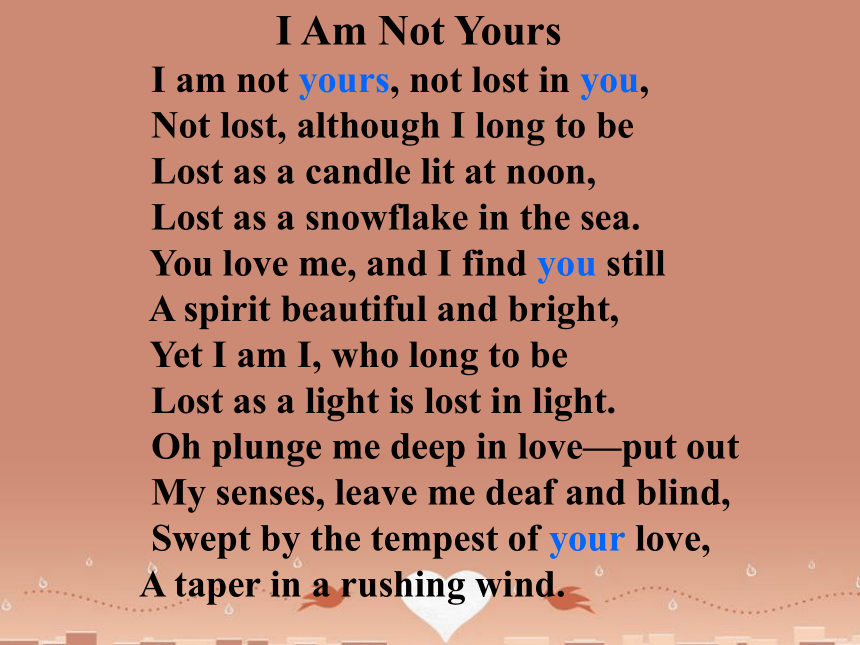
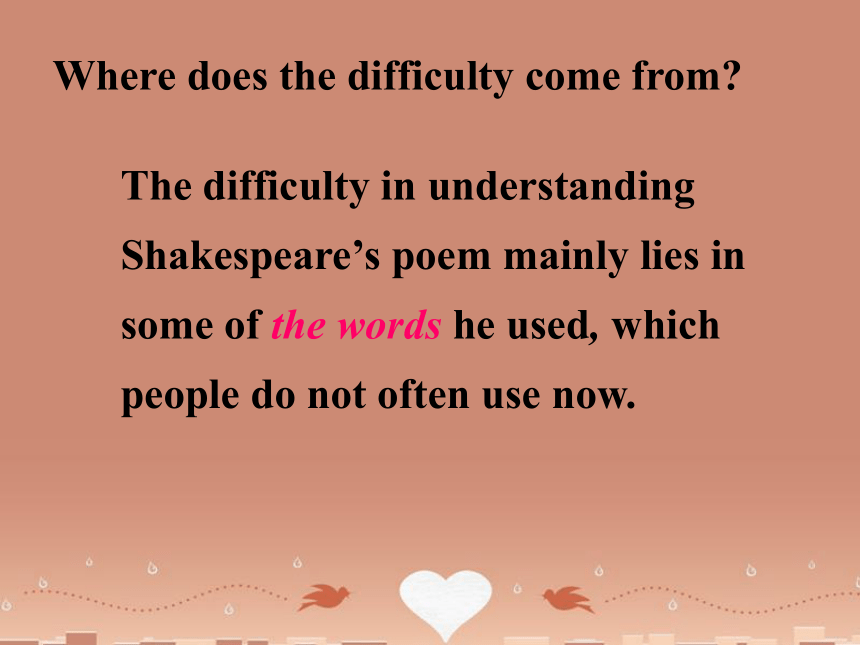
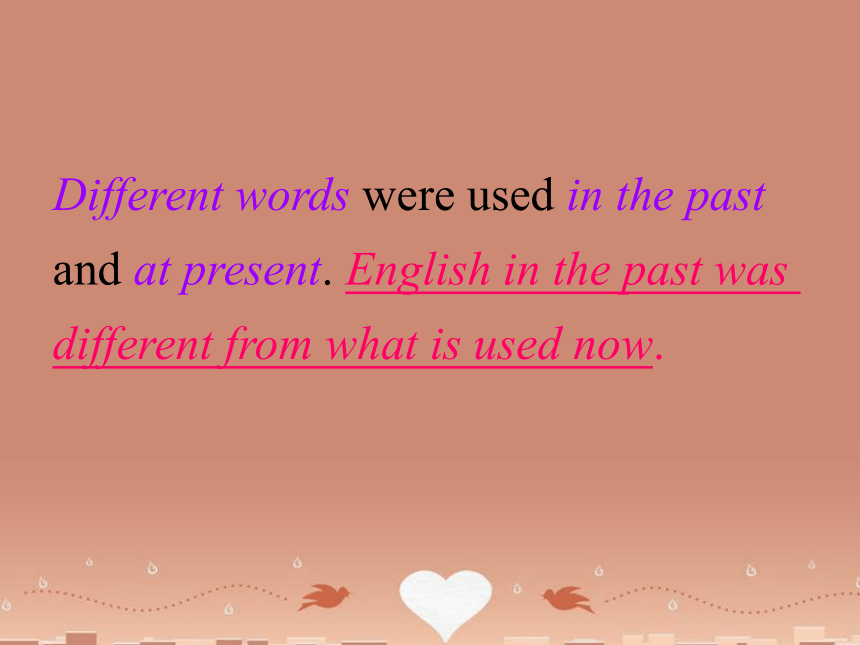
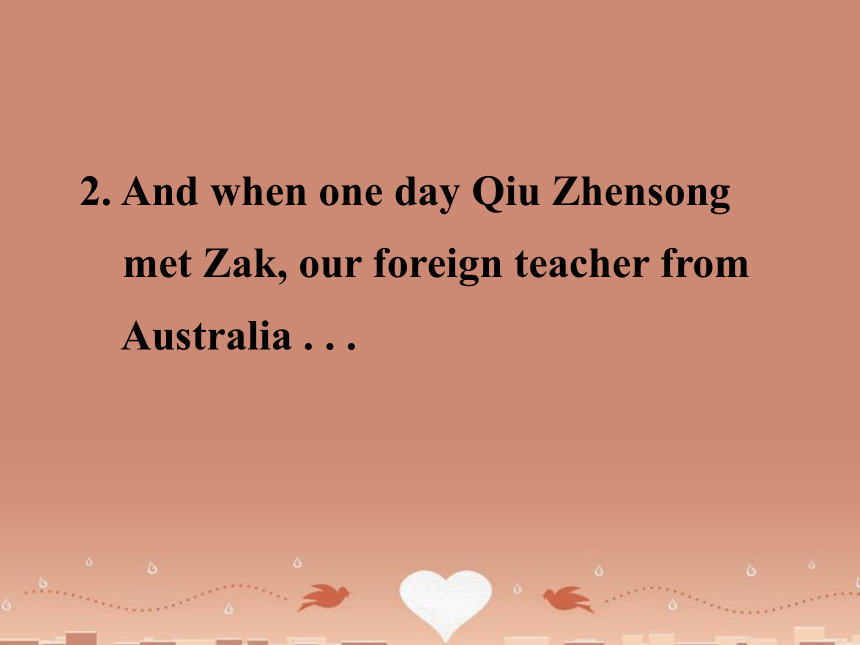
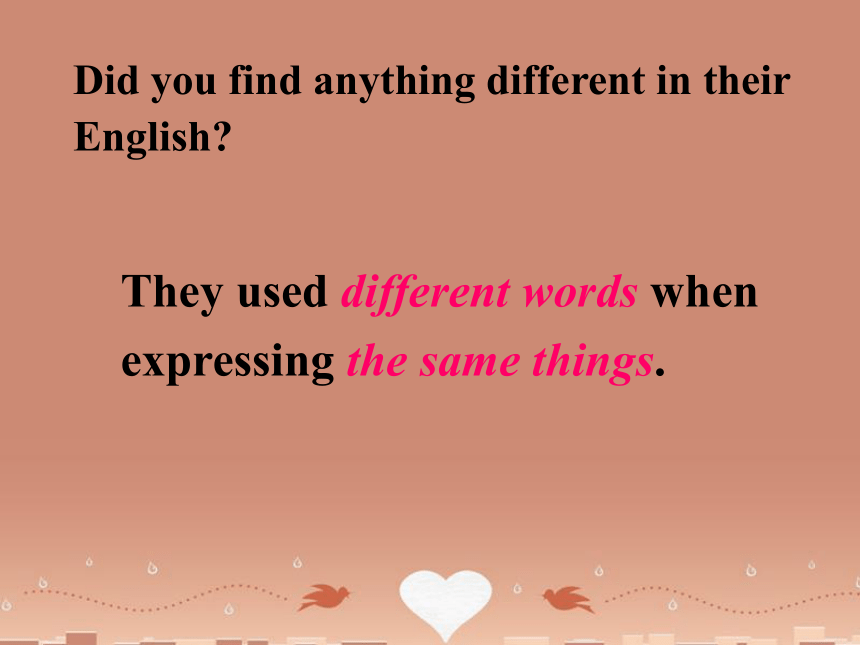
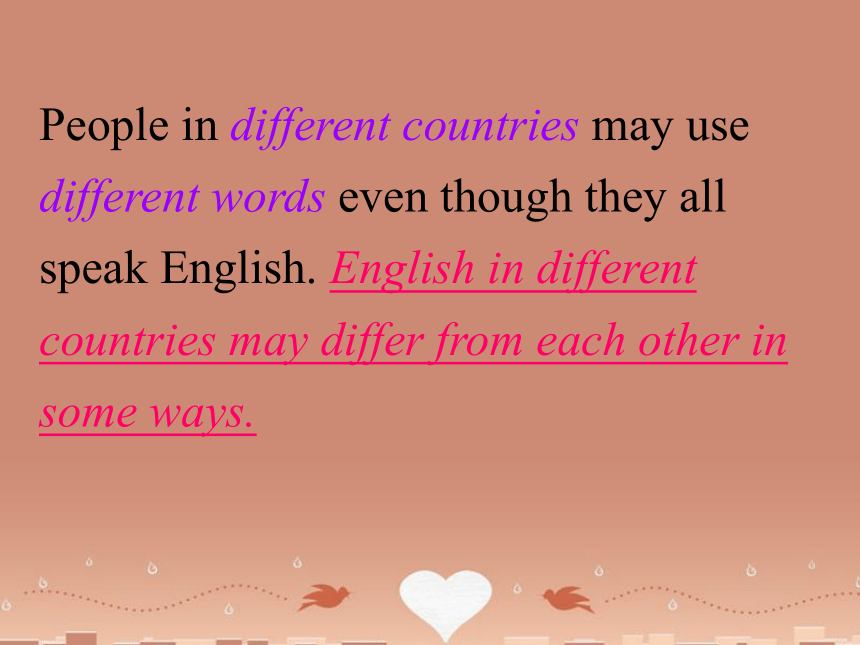
文档简介
课件34张PPT。
Unit 2 English around the world
The road to modern English
Reading
The road to modern EnglishLead-in:
1. Test yourself:
Do you have any difficulty in
understanding this poem?A Red Red Rose
Robert BurnsO, my Luve's like a red, red rose That's newly sprung in June; O, my Luve's like the melodie, That's sweetly play'd in tune.
As fair art thou, my bonnie lass, So deep in luve am I; And I will luve thee still, my dear, Till a' the seas gang dry.Till a' the seas gang dry, my dear, And the rocks melt wi' the sun; I will luve thee still, my dear, While the sands o' life shall run.
And fare thee well, my only Luve! And fare thee well, a while! And I will come again, my Luve, Tho' it were ten thousand mile!
What about this one? I Am Not Yours
I am not yours, not lost in you,
Not lost, although I long to be
Lost as a candle lit at noon,
Lost as a snowflake in the sea.
You love me, and I find you still
A spirit beautiful and bright,
Yet I am I, who long to be
Lost as a light is lost in light.
Oh plunge me deep in love—put out
My senses, leave me deaf and blind,
Swept by the tempest of your love,
A taper in a rushing wind.The difficulty in understanding
Shakespeare’s poem mainly lies in
some of the words he used, which
people do not often use now.Where does the difficulty come from?Different words were used in the past
and at present. English in the past was
different from what is used now.2. And when one day Qiu Zhensong
met Zak, our foreign teacher from
Australia . . .Did you find anything different in their English?They used different words when
expressing the same things.People in different countries may use different words even though they all speak English. English in different countries may differ from each other in some ways.People from different countries speak different English and people in different times also use different English.
Thinking: How did it come about?
Pre-reading:Guessing from the title:The road to modern Englishthe roadmodern EnglishWhat is
modern
English like?the development of
English what kind of English
before? 1. change of English
2. change of English speakers
3. English spoken in some other countries
4. English spoken in the past
5. different kinds of English
Predicting: What will be talked about in
a passage with such a title? While-reading:
Group work: Work in groups of five, each
reads only one paragraph, finds out the topic
sentence or main idea for the paragraph,
write it down, and then tells the other group
members your idea to get a general idea
of the passage and judge whether your
prediction is right or wrong.Read to know:Para 1: Many people _________ the world speak
English.
Para 2: Native speakers can understand _________
even if they don’t speak _______________
English.
Para 3: Why has English changed __________ .
Para 4: Finally by the 19th century the
language __________.
Para 5: English is spoken as a _______ or _______
language in _______ and ______.Main idea of each paragraph:
all overeach otherthe same kind ofover timewas settledforeignsecondAfricaAsiaRead to construct:According to the main idea of each paragraph, can you see the relationship of the five paragraphs? Or how many parts can we divide the passage into?Main idea of each paragraph:
Para 1: Many people all over the world speak
English.
Para 2: Native speakers can understand each other
even if they don’t speak the same kind of
English.
Para 3: Why has English changed over time.
Para 4: Finally by the 19th century the
language was settled.
Para 5: English is spoken as a foreign or second
language in Africa and Asia.The main idea of the passage lies in the first sentence of the third paragraph:
________________________________Para 1
Para 2﹜a general introduction to the use of
EnglishPara 3
Para 4
Para 5﹜the gradual change and development
of Englishwhy has English changed over time?Conclusion:English has changed over time.Actually, all languages change and
develop when cultures meet and
communicate with each other.Read to find:Read the text carefully, esp. paragraphs 3 to 5, and find out the following information mentioned in the passage and fill in the chart:
2. related languages1. time4. related events/what happened3. placesTwo main periods in the development of English:from AD 450 to 1150:influenced by other
languagesruled by other countriesfrom the 1700s on:influencing other languagesruling other countries You have to be strong enough to
influence others.
Conclusion:So do a country and a language.Post-reading:Discussion: Do you hope that Chinese will one
day take the place of English and
become the most widely used
language in the world? If you do
think so, how do you think we can
do it? What should you do?
Work in pairs and then report
your idea to the class.
For a language to influence others:
a strong enough countrycultures to meet and communicate . . . (Try to use the words and expressions learned in
the reading passage, e.g. at present, because of,
actually, make use of, vocabulary, such as, fluent,
gradually, be based on, etc.)Suggestions:As a student, what can I do for my country?Homework:1. Further thinking: Why did the writer end the
passage with a question?
“Will Chinese English develop its own identity?
Only time will tell.”
Suggestions:
Is this question more about Chinese
or English?
Did the writer want to talk about the
future of Chinese or English?
What will its future be like?
2. From the text we know that two persons
played an important part in the develop-
ment of English. What were their roles?
Read the 4th paragraph again and refer
to what you can find about them on the
Internet and write a short passage
about their contributions to English.Thank you!
Unit 2 English around the world
The road to modern English
Reading
The road to modern EnglishLead-in:
1. Test yourself:
Do you have any difficulty in
understanding this poem?A Red Red Rose
Robert BurnsO, my Luve's like a red, red rose That's newly sprung in June; O, my Luve's like the melodie, That's sweetly play'd in tune.
As fair art thou, my bonnie lass, So deep in luve am I; And I will luve thee still, my dear, Till a' the seas gang dry.Till a' the seas gang dry, my dear, And the rocks melt wi' the sun; I will luve thee still, my dear, While the sands o' life shall run.
And fare thee well, my only Luve! And fare thee well, a while! And I will come again, my Luve, Tho' it were ten thousand mile!
What about this one? I Am Not Yours
I am not yours, not lost in you,
Not lost, although I long to be
Lost as a candle lit at noon,
Lost as a snowflake in the sea.
You love me, and I find you still
A spirit beautiful and bright,
Yet I am I, who long to be
Lost as a light is lost in light.
Oh plunge me deep in love—put out
My senses, leave me deaf and blind,
Swept by the tempest of your love,
A taper in a rushing wind.The difficulty in understanding
Shakespeare’s poem mainly lies in
some of the words he used, which
people do not often use now.Where does the difficulty come from?Different words were used in the past
and at present. English in the past was
different from what is used now.2. And when one day Qiu Zhensong
met Zak, our foreign teacher from
Australia . . .Did you find anything different in their English?They used different words when
expressing the same things.People in different countries may use different words even though they all speak English. English in different countries may differ from each other in some ways.People from different countries speak different English and people in different times also use different English.
Thinking: How did it come about?
Pre-reading:Guessing from the title:The road to modern Englishthe roadmodern EnglishWhat is
modern
English like?the development of
English what kind of English
before? 1. change of English
2. change of English speakers
3. English spoken in some other countries
4. English spoken in the past
5. different kinds of English
Predicting: What will be talked about in
a passage with such a title? While-reading:
Group work: Work in groups of five, each
reads only one paragraph, finds out the topic
sentence or main idea for the paragraph,
write it down, and then tells the other group
members your idea to get a general idea
of the passage and judge whether your
prediction is right or wrong.Read to know:Para 1: Many people _________ the world speak
English.
Para 2: Native speakers can understand _________
even if they don’t speak _______________
English.
Para 3: Why has English changed __________ .
Para 4: Finally by the 19th century the
language __________.
Para 5: English is spoken as a _______ or _______
language in _______ and ______.Main idea of each paragraph:
all overeach otherthe same kind ofover timewas settledforeignsecondAfricaAsiaRead to construct:According to the main idea of each paragraph, can you see the relationship of the five paragraphs? Or how many parts can we divide the passage into?Main idea of each paragraph:
Para 1: Many people all over the world speak
English.
Para 2: Native speakers can understand each other
even if they don’t speak the same kind of
English.
Para 3: Why has English changed over time.
Para 4: Finally by the 19th century the
language was settled.
Para 5: English is spoken as a foreign or second
language in Africa and Asia.The main idea of the passage lies in the first sentence of the third paragraph:
________________________________Para 1
Para 2﹜a general introduction to the use of
EnglishPara 3
Para 4
Para 5﹜the gradual change and development
of Englishwhy has English changed over time?Conclusion:English has changed over time.Actually, all languages change and
develop when cultures meet and
communicate with each other.Read to find:Read the text carefully, esp. paragraphs 3 to 5, and find out the following information mentioned in the passage and fill in the chart:
2. related languages1. time4. related events/what happened3. placesTwo main periods in the development of English:from AD 450 to 1150:influenced by other
languagesruled by other countriesfrom the 1700s on:influencing other languagesruling other countries You have to be strong enough to
influence others.
Conclusion:So do a country and a language.Post-reading:Discussion: Do you hope that Chinese will one
day take the place of English and
become the most widely used
language in the world? If you do
think so, how do you think we can
do it? What should you do?
Work in pairs and then report
your idea to the class.
For a language to influence others:
a strong enough countrycultures to meet and communicate . . . (Try to use the words and expressions learned in
the reading passage, e.g. at present, because of,
actually, make use of, vocabulary, such as, fluent,
gradually, be based on, etc.)Suggestions:As a student, what can I do for my country?Homework:1. Further thinking: Why did the writer end the
passage with a question?
“Will Chinese English develop its own identity?
Only time will tell.”
Suggestions:
Is this question more about Chinese
or English?
Did the writer want to talk about the
future of Chinese or English?
What will its future be like?
2. From the text we know that two persons
played an important part in the develop-
ment of English. What were their roles?
Read the 4th paragraph again and refer
to what you can find about them on the
Internet and write a short passage
about their contributions to English.Thank you!
